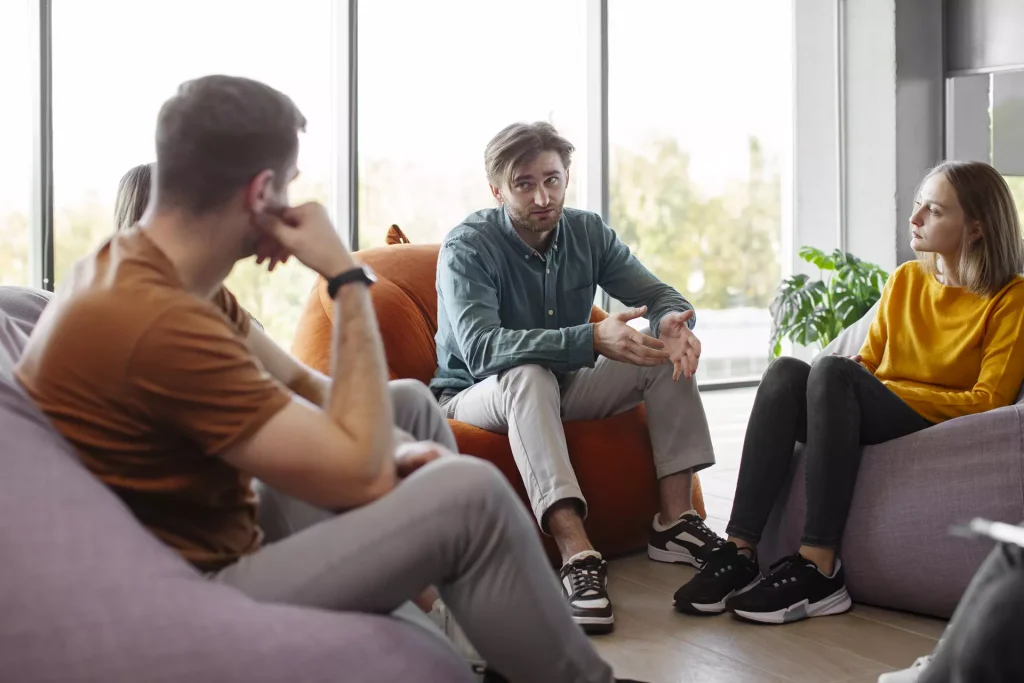24/7 Helpline:
(866) 899-111424/7 Helpline:
(866) 899-1114
Learn more about Aftercare Support centers in Marion
Aftercare Support in Other Cities

Other Insurance Options

Self-pay options

Humana

Multiplan

Group Health Incorporated

Providence

Health Choice

WellPoint

MHNNet Behavioral Health

Sliding scale payment assistance

State Farm
Beacon

Excellus

EmblemHealth

Private insurance

Oxford

Horizon Healthcare Service

Health Partners

PHCS Network

Ceridian

Magellan

Carbondale DUI & Counseling Associates, Inc.
Carbondale DUI & Counseling Associates, Inc. is a private rehab located in Marion, Illinois. Carbond...

Centerstone Marion – Main Street Campus
Centerstone Marion – Main Street Campus is a private rehab located in Marion, Illinois. Centerstone ...

Grant Blackford Mental Health – Milestone Addiction Services
Grant Blackford Mental Health - Milestone Addiction Services offers outpatient treatment for individ...

Premier Care of Indiana
Premier Care of Indiana is a private rehab located in Marion, Indiana. Premier Care of Indiana speci...

Cornerstone Behavioral Health
Cornerstone Behavioral Health, in Marion, Indiana, is a comprehensive mental and behavioral health f...

Grant Blackford Mental Health – Keystone Family Resource Center
Grant Blackford Mental Health - Keystone Family Resource Center offers outpatient treatment for indi...

Crossroads Recovery Center
Crossroads Recovery Center, in Marion, North Carolina, is an outpatient alcohol and drug rehab for a...

McLeod Addictive Disease Center
McLeod Addictive Disease Center, located in Marion, North Carolina, offers behavioral healthcare and...

Maryhaven Marion
Maryhaven Marion is a private rehab located in Marion, Ohio. Maryhaven Marion specializes in the tre...

Marion Area Counseling Center – MACC
Marion Area Counseling Center (MACC) is a private not-for-profit full service mental health agency p...

Brightview – Marion Addiction Treatment Center
Brightview – Marion Addiction Treatment Center is a private rehab located in Marion, Ohio. Brightvie...

Spero Health – Marion
Spero Health – Marion is a private rehab located in Marion, Ohio. Spero Health – Marion specializes ...

Pee Dee Mental Health
Pee Dee Mental Health is a public rehab located in Marion, South Carolina. Pee Dee Mental Health spe...

VASAP – Virginia Alcohol Safety Action Program – Mount Rogers
Virginia Alcohol Safety Action Program (VASAP) - Mount Rogers provides substance abuse treatment for...

Cahaba Center for Mental Health
Cahaba Center for Mental Health, located in Marion, Alabama, is a drug and alcohol rehab offering re...

Dayspring of Arkansas – Marion
Dayspring of Arkansas - Marion is an alcohol and drug rehab program that offers behavioral healthcar...

The Pointe Outpatient Behavioral Health Services – Marion
The Pointe Outpatient Behavioral Health Services - Marion, provides behavioral health care services ...

Centerstone – County Parkway
Centerstone - County Parkway, non-profit agency, houses office-based outpatient services for childre...

Grant Blackford Mental Health – Community Support
Grant Blackford Mental Health - Community Support offers outpatient treatment for individuals with a...

Cedar Valley Recovery Services
Cedar Valley Recovery Services is a private rehab located in Marion, Iowa. Cedar Valley Recovery Ser...

Wilderness Treatment
Wilderness Treatment Center is located in Marion, Montana. Wilderness Treatment is a family owned, 6...

Woodridge Psychological Associates
Woodridge Psychological Associates is a private rehab located in Marion, North Carolina. Woodridge P...

Foundations Recovery Center
Foundations Recovery Center is a private not-for-profit full service mental health agency providing ...

AA – Alcoholics Anonymous – East Center Street
Alcoholics Anonymous (AA) - East Center Street provides outpatient services for individuals with alc...

COAP
COAP is a private rehab located in Marion, Ohio. COAP specializes in the treatment of alcoholism, dr...

Marion Area Counseling Center – MACC Satellite
Marion Area Counseling Center - MACC Satellite is a private not-for-profit full service mental healt...

Marion Area Counseling Center – MACC West
Marion Area Counseling Center - MACC West is a private not-for-profit full service mental health age...

Trinity Behavioral Care
Trinity Behavioral Care located in Marion, South Carolina. Trinity Behavioral Care provides effectiv...

Mount Rogers Community Services Board – Smyth Counseling Center
Mount Rogers Community Services Board – Smyth Counseling Center is a public rehab located in Marion,...

